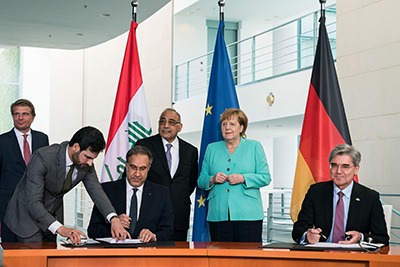German conglomerate Siemens has announced the signing of agreement with the Iraq Ministry of Electricity for implementation of the roadmap to rebuild the Iraq's power sector.

Image: Siemens president and CEO Joe Kaeser and Iraq Minister of Electricity Luay al-Khatteeb have signed the agreement in Berlin. Photo: Courtesy of Bundesregierung/Steffen Kugler.
In October 2018, Siemens and the ministry have signed the exclusive memorandum of understanding based on which, the present roadmap agreement was shaped outlining specific projects, their budgets and timelines, covering all essential elements of the electrification of Iraq.
The scope of roadmap agreement includes short, mid- and long-term addition of new and highly-efficient power generation capacity, rehabilitation and upgrade of existing plants and the expansion of transmission and distribution networks.
Siemens president and CEO Joe Kaeser and Iraq Minister of Electricity Luay al-Khatteeb have signed the agreement in Berlin in the presence of Iraq Prime Minister Adil Abdul-Mahdi and Federal Republic of Germany Chancellor Angela Merkel.
Under the implementation agreement, both the parties have also agreed on the award of contracts worth approximately €700m.
The contracts include the EPC construction of a 500MW gas-fired power plant in Zubaidiya, upgrade of 40 gas turbines with upstream cooling systems and installation of 13 of 132kv substations along with 34 transformers across Iraq.
Siemens said that the roadmap for the electrification of the new Iraq is a series of short, medium and long-term plans designed to meet the reconstruction goals of Iraq and support the country’s economic development.
Kaeser said: “Our mission is to secure reliable and affordable electricity for the Iraqi people and help them rebuild their country. This binding agreement addresses the various aspects of the roadmap. We are also committed to supporting Iraq in arranging financing for the projects, creating attractive jobs and opportunities for small and medium enterprises.
“Investing in the country’s future workforce through education and training is close to our heart. Contributing to social and economic development is at the core of what we do and forms a significant part of this agreement.”
The company added that the economic viability of the plan is secured by billions of US dollars in potential fuel savings and revenue generation for the electricity sector.
